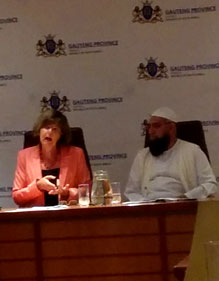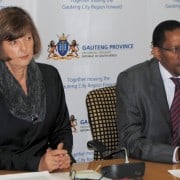|
Getting your Trinity Audio player ready...
|
 The Gauteng department of roads and transport, with the provincial department of finance, is piloting a revised tender process which is expected to bring unprecedented levels of openness and transparency to the murky waters of government tendering.
The Gauteng department of roads and transport, with the provincial department of finance, is piloting a revised tender process which is expected to bring unprecedented levels of openness and transparency to the murky waters of government tendering.
At a joint media briefing yesterday, finance MEC Barbara Creecy, with her transport counterpart Ismail Vadi, announced details of the new open tender process, which will be piloted through the R50-million-plus upgrade of Cedar Road in Sandton. This busy stretch of road runs between Muldersdrift and Fourways, and is scheduled to be widened between those two suburbs.
The aim of the revised process is to restore public confidence in government tenders, procurement, and spending. “We believe that the best way to do this is to make the process more open to public scrutiny so that bidders are convinced that the award process is fair and transparent," said Creecy.
The open tender process also complies with the supply chain management provisions of the Public Finance Management Act .
Vadi expressed his pleasure at the choice of his department for the pilot phase. “We are enhancing the tender process, and closing the loopholes where people can manipulate it. We welcome the chance for greater public scrutiny – we want to get rid of the perception that all government is corrupt.”
He added that the ideal way to do this is to throw open all the doors and windows and to ask people to come inside. Secrecy and opacity created an environment in which corruption could breed. “Now’s your chance to be a fly on the wall of the tender process, so that you can satisfy yourself that everything is above board.”
Creecy said that the provincial government wanted to “make it difficult for people to engage in corruption by ensuring that tender decision-making processes were transparent”.
Unprecedented levels of transparency
One of the new developments in the open tender process is the introduction of a probity audit for all tenders with a value of more than R50-million. Probity auditing is an activity undertaken by an independent entity to ensure that the tendering, negotiation and contract award processes are fair and equitable. The auditing team will be appointed by provincial treasury and will use a copy of the bid evaluation criteria as guidance.
The big change in the process is the opening, once the probity audit has been concluded, of the bid adjudication process to public scrutiny, although there will be no public participation. Once this is done, tender outcomes will be published on the website of the provincial treasury department.
The new tender process runs basically as follows:
- Tender design, where the conditions, both standard and special, of the contract are established, as well as the bid evaluation criteria and estimates of time and cost. This information must be accurate and detailed, as vagueness opens the process to corruption;
- The tender specification committee will sign off on the tender documents and bid evaluation criteria, and agree on a tender publication date;
- The supply chain management process will kick in at this point. The tender box will be opened in public and details of each bidder and bid amount will be read out, so that the public will be able to immediately identify bidders that offer lower prices. In addition, tender documents will be imprinted in public to avoid potential switching of crucial information later on. The provincial treasury will also publish the list on its website within 48 hours, and make public the date on which the evaluation process will start.
- The bid evaluation committee takes over, and once it has done its work, will recommend the lowest bidder. If this is not possible, it must supply reasons for its decision and motivate for the second lowest bidder. This stage will be verified by the probity audit team, and the names of bidders who comply with the requirements will be published on the website.
- The bid adjudication process will now be opened for public observation.
- The tender will be awarded and the name of the successful bidder will be published, as well as the tender amount and the expected construction period.
- Every three months, a team will visit the site to ensure that work is on track, and contractors who do not perform will be reported to Treasury.
“We want to get to the stage where every tender is rolled out through this process,” said Creecy. “If we exclude this one for strategic reasons or that one for another reason, it will bring up all the old issues of trust again. All tenders in provincial government must go through this process – we won’t restore public confidence if some do and others don’t.”
Rollout to other provinces in due course
The roads and transport department handles over 100 tender projects every year. “We are ready to make the process operational,” said Vadi, “and make awards as early as April 2015.”
Once the pilot phase is over, it will undergo refining and tweaking where necessary before the Gauteng executive council makes a decision to adopt it across the province.
“We also expect that by April we should be able to evaluate the process and take the results to Cabinet, where we will inform them of how we plan to roll it out to other provinces,” Creecy said.
She added that the enhanced tender process would entail much extra work for departments, but they would receive support from her team.






